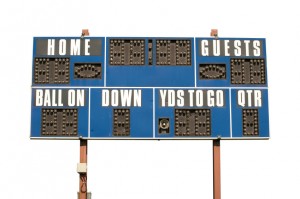Who’s Winning?: Wrong Question!
My Dad used to have an interesting little quirk that I have only recently begun to fully appreciate. If you came in late while he was watching a football game on TV, and asked him who was winning, he would say he didn’t know, even if he knew the score. His perspective was that while a team might be ahead, it could still be in the process of losing the game—and vice versa.
The score during a game is only a clue to which team is winning. Sometimes it’s an excellent clue, but not always.
It sounds like just a silly semantic difference, but it also dovetails nicely with another idea I have read in a book by Dr. Jason Selk, Executive Toughness. In the foreword, Andy Hill, who played for John Wooden at UCLA, tells of how Wooden would never focus on winning or losing. Instead he would focus on the processes that would most likely lead to winning. The reason is that the final score is ultimately out of your control. The only thing any player can control is the degree to which they stick to their process—the process they have learned and practiced. You can’t control outcomes, but you can control your preparation, execution and effort.
It’s the same in business and in life. In a sales call or sales presentation, you can’t control whether the prospect will decide to buy your solution; if you’re a recent college graduate interviewing for your first job, you can’t control whether you get hired (especially in this economy); if you’re an entrepreneur, you can’t control whether the world beats a path to your door to buy your mousetrap, but you can control your preparation, execution and effort.
As Selk tells us, we do need to set product goals, but then we have to focus in the moment on process goals, which describe the inputs and behaviors that lead to outcomes. In other words, after you set your goals, the most important step is to figure out a plan and a process to reach your goals. Then, set aside your product goals, and focus on your process goals. For example, to reach your sales quota you know you will have to make a certain number of calls a day, leading to a certain number of appointments, and so on.
You can also focus on progress goals, which are about growth and learning. As Heidi Halvorsen says in Succeed, they are not about proving yourself but about improving yourself. Focusing on progress goals keeps you motivated and prevents you from giving up too soon in the face of the inevitable setbacks.
Even the common advice that you should envision reaching your goals turns out to be wrong. Don’t envision achieving your goals, envision what you will do to achieve them. When things get rough, too much focus on your goals can get you to start worrying about things you can’t control, and because you can only concentrate on one thing at a time, your focus on the things you can control will necessarily suffer. Forget the score and focus on the process. Even when things are going well, focusing on the process can keep you from getting too excited or complacent and making mistakes which can lose it for you.
It’s a paradox, but focusing too intently on the end goal can lower your chance of reaching it. As Selk says, “…focusing too intently on the ‘shot,’ or the desired result, adds pressure and distracts the mind from the fundamentals of the process.” It can also lead to target fixation, in which your focus gets so narrow that you don’t recognize the hazards and opportunities around you. The flip side to this paradox is that forgetting about keeping score is the surest way to come out ahead in the end.
Process goals also imply consistency of effort. In Great by Choice, Jim Collins and Morten Hansen introduce the idea of “20 mile marches.” If you had to cross the country on foot, you could do it in about five months if you consistently walked 20 miles every single day. This does not mean average 20 miles a day, it means exactly 20 miles a day. So, on the days when the weather is fine and the walking is easy, you finish early and then rest, rather than trying to make up ground. As a result, on the inevitable days when walking is tough, you will have the strength and stamina to make 20 miles in spite of the difficulty. Although it sounds like a parable, this is precisely the approach taken by Amundsen and his team on their race to the South Pole against Robert F. Scott. Amundsen won the race, Scott died in the attempt. Twenty mile marches are about discipline and taking the long view.
If you focus less on outcomes and more on process, progress and discipline, you will be a winner. So, stop asking yourself who’s winning—ask yourself if you’re doing everything it takes to win.




[…] success, but it also works at individual levels, during the actual performance on game day. As sports psychologist Jason Selk says, it’s OK to set product goals, but then we must focus our attention on process goals, because […]
Fantastic stuff, as usual, Jack!
I might also add that a process-focus has been associated not only with more positive outcomes, but also more internal locus of control and life and job satisfaction. A real win-win-win!